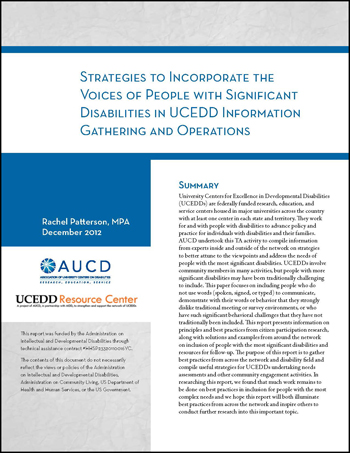Strategies to Incorporate the Voices of People with Significant Disabilities in UCEDD Information Gathering and Operations
March 4, 2013

|
| Download |
|
|
Author: Rachel Patterson, MPA
Publisher: AUCD, 2013
Given the importance of needs assessments and other information-gathering to UCEDD planning and operations, it is critical that information be gained from a wide spectrum of individuals with disabilities and their families. For this report, we sought out strategies on how best to include the voices of people who many not have been typically included in UCEDD needs assessments or CACs and who, by the nature of their disabilities, face significant barriers to participation.
This report focuses on people who have the most significant disabilities. For the purposes of this report, "most significant disabilities" is defined as those disabilities which may create a barrier to participation in UCEDD needs assessments or other information-gathering activities that use traditional or conventional strategies. These could be any significant intellectual, communication, or behavioral challenges that make participation in traditional meetings, focus groups, written or oral surveys, or other information-gathering methods either very difficult or impossible using traditional methods of inclusion. These include people who do not use words (spoken, signed, or typed) to communicate, demonstrate with their words or behavior that they strongly dislike traditional meeting or survey environments, or who have such significant behavioral challenges that they have traditionally been excluded. This report provides principles for full participation drawn from public participation research, then outline tools and strategies identified by network members and other experts for the inclusion of people with the most significant disabilities in information gathering efforts.
Based on many questions received during the interview process, we wish to emphasize that this report does not assume that all people with significant disabilities have the same wants, needs, or feelings about participation, or that they all face the same challenges to participation that we outline here. Our analysis is based on the assumption that gathering a diverse sample of people is essential for UCEDD planning and that many people with significant disabilities want to participate in activities that solicit their input/opinions, but our traditional means of gathering information may have been inaccessible to them. We undertook this activity to find successful and innovative strategies to include a group of people who may have been excluded in the past.







